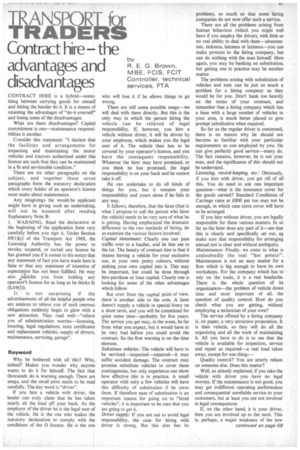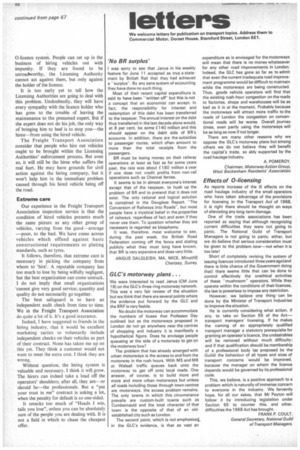TRANSLORT.b.r TRAUPERW
Page 69

Page 70

If you've noticed an error in this article please click here to report it so we can fix it.
Contract hire the
advantages and disadvantages
by R. E. G. Brown, MBE, FCIS, FCIT Controller, technical services, FTA CONTRACT HIRE is a hybrid—something between carrying goods for oneself and letting the haulier do IL It is a means of retaining the advantages of "do-it-yourself' and losing some of the disadvantages.
What are these disadvantages? Capital commitment is one—maintenance responsibilities is another.
Consider this statement: "I declare that the facilities and arrangements for inspecting and maintaining the motor vehicles and tractors authorized under this licence are such that they can be maintained in a fit and serviceable condition."
There are six other paragraphs on the subject, and together these seven paragraphs form the statutory declaration which every holder of an operator's licence must make about maintenance.
Any misgivings the would-be applicant might have in giving such an undertaking, will not be lessened after reading Explanatory Note B:
I. WARNING. Read the declaration at the beginning of the application form very carefully before you sign it. Under Section 69(IXc) of the Transport Act 1968, the Licensing Authority has the power to revoke, suspend, or curtail any licence he has granted you if it comes to his notice that any statement of fact you have made here is false or that any statement of intention of expectation has not been fulfilled. He may also prohibit you from holding any operator's licence for as long as he thinks fit (S.69(5)).
It is not surprising if the advertisements of all the helpful people who are anxious to relieve you of such onerous obligations suddenly begin to glow with a new attraction. They read well—"relieve you of administration worries—licensing, insuring, legal regulations, tests certificates and replacement vehicles, supply of drivers, maintenance, servicing, garage".
Keyword Why be bothered with all' this? Why, indeed? Makes you wonder why anyone wants to do it for himself. The fact that thousands do is warning enough. There are snags, and the small print needs to be read carefully. The key word is "driver".
If you hire a vehicle with driver, the lender can truly claim that he has taken nearly all the load off your back. As the employer of the driver he is the legal user of the vehicle. He is the one who makes the statutory declaration to comply with the conditions of the 0 licence. He is the one who will lose it if he allows things to go wrong.
There are still some possible snags—we will deal with them directly. But this is the only way in which the person hiring the vehicle can be relieved of legal responsibility. If, however, you hire a vehicle without driver, it will be driven by your employee, which makes you the legal user of it. The vehicle then has to be covered by your operator's licence, and you have the consequent responsibility. Whatever the hirer may have promised, or you think he has promised, the legal responsibility is on your back and he cannot take it off.
He can undertake to do all kinds of things for you, but it remains your responsibility and yours alone if he fails in any way.
It follows, therefore, that the hiree (that is what I propose to call the person who hires the vehicle) needs to be very sure of what he is getting. Having emphasized the dramatic difference in the two methods of hiring, let us examine the various factors involved:
Capital investment: Clearly one can pass traffic over to a haulier, and let him see to the lot. The beauty of contract hire is that it means having a vehicle for your exclusive use, in your own pretty colours, without sinking your own capital into it. This may be important, but could be done through hire-purchase or loan capital. Clearly one is looking for some of the other advantages which follow.
But even from the capital point of view, there is another side to the coin. A hirer doesn't supply a vehicle in special livery on a short term, and you will be committed for quite some time—probably for five years. The service you get may, in the event, be far from what you expect, but it would have to be very bad before you could avoid the contract. So the first warning is on the time element.
Substitute vehicles: The vehicle will have to be serviced—inspected—repaired--it may suffer accident damage. The contract may promise substitute vehicles to cover these contingencies, but only experience can show how effective this is in practice. A small operator with only a few vehicles will have this difficulty of substitution if he owns them. If therefore ease of substitution is an important reason for going on to "hired vehicles", it is important to be sure that you are going to get it.
Driver supply: If you are out to avoid legal responsibility, the case for hiring with driver is strong. But this also has its
problems, so much so that some hiring companies do not now offer such a service.
There are all the problems arising from human behaviour (which you might well have if you employ the driver), with little or no real ability to deal with them—absenteeism, sickness, lateness or laziness—you can make protests to the hiring company, but can do nothing with the man himself. Here again, you may be banking on substitution, but getting one in practice may be another matter.
The problems arising with substitution of vehicles and men can be just as much a problem for a hiring company as they would be for you. Don't bank too heavily on the terms of your contract, and remember that a hiring company which has a base with a large number of vehicles in your area, is much better placed to give prompt substitution when required.
So far as the regular driver is concerned, there is no reason why he should not become as familiar with your particular requirements as one employed by you. He can give perfectly good service—many do. The fact remains, however, he is not your man, and the-significance of this should not be underrated.
Licensing record-keeping etc.: Obviously, if you hire with driver, you get rid of all this. You do need to ask one important question—what is the insurance cover for the goods carried? Standard Conditions of Carriage rates at £800 per ton may not be enough, in which case extra cover will have to be arranged.
If you hire without driver, you are legally responsible for these various matters. In so far as the hirer does any part of it—see that this is clearly and specifically set out, eg make sure that responsibility for arranging annual test is clear and without ambiguity. Maintenance: Finally, we come to what is undoubtedly the real "hot potato". Maintenance is not an easy matter for a firm which is big enough to have its own workshops. For the company which has to rely on the trade, it is a real headache. There is the whole question of its organization—the problem of vehicle down time and most important of all, the question of quality control. How do you check what you are getting, without employing a technician of your own?
The service offered by a hiring company is, on paper, a very attractive proposition. It is their vehicle, so they will do all the organizing and all the work of maintaining it. All you have to do is to see that the vehicle is available for inspection, service and repair as required—a real load taken away, except for one thing:—
Quality control? You are utterly reliant on someone else. Does this matter?
Well, as already explained, if you take the vehicle with driver you have no legal worries. If the maintenance is not good, you may get indifferent operating performance and consequential unreliable service to your customers, but at least you are not involved in legal consequences.
If, on the other hand, it is your driver, then you are involved up to the neck. This is, perhaps, a major weakness of the new continued on page 68 0-licence system. People can set up in the business of hiring vehicles out with impunity. If they are found to be unroadworthy, the Licensing Authority cannot act against them, but only against the holder of the licence.
It is too early yet to tell how the Licensing Authorities arc going to deal with this problem. Undoubtedly. they will have every sympathy with the licence holder who has gone to the trouble of leaving the maintenance to the presumed expert. But if the expert does not do his job, the only way of bringing him to heel is to stop you—the hiree—from using the hired vehicle.
The Freight Transport Association consider that people who hire out vehicles ought to be brought within the Licensing Authorities' enforcement process. But even so, it will still be the hiree who suffers the real hurt. He may have grounds for civil action against the hiring company, but it won't help him in the immediate problem caused through his hired vehicle being off the road.
Extreme care Our experience in the Freight Transport Association inspection service is that the condition of hired vehicles presents much the same picture as any other group of vehicles, varying from the good--average —poor, to the bad. We have come across vehicles which offend against basic constructional requirements or plating standards, such as tyres.
It follows, therefore, that extreme care is necessary in picking the company from whom to 'hire'. A reputable company has too much to lose by being wilfully negligent, but the best organization can come unstuck. I do not imply that small organizations 'cannot give very good service; quantity and quality do not necessarily go together.
The best safeguard is to have an independent audit check from time to time. We in the Freight Transport Association do quite a lot of it. It's a good insurance.
Indeed. I have suggested to friends in the hiring industry, that it would be excellent marketing tactics to voluntarily include independent checks on their vehicles as part of their contract. None has taken me up on this yet. They think a customer would not want to meet the extra cost. I think they are wrong.
Without question, the hiring system is valuable and necessary. I think it will grow. The hirers can indeed take a load off the operators' shoulders; after all, they are--or should be—the professionals. But a "put your trust in me" contract is asking a lot, when the penalty for default is so one-sided.
It smacks too much of "Heads I win, tails you lose", unless you can be absolutely sure of the people you are dealing with. It is not a field in which to chase the cheapest offer.












































































































































